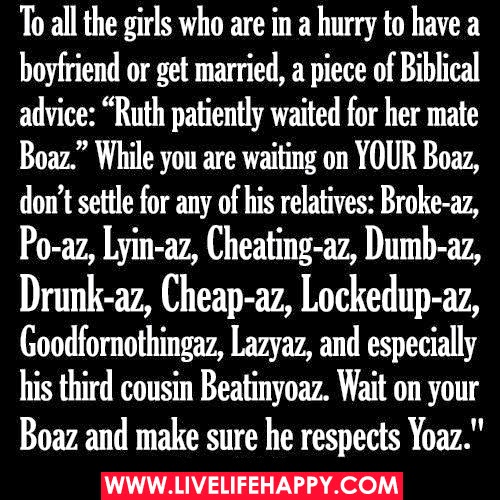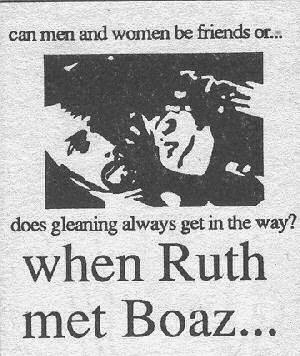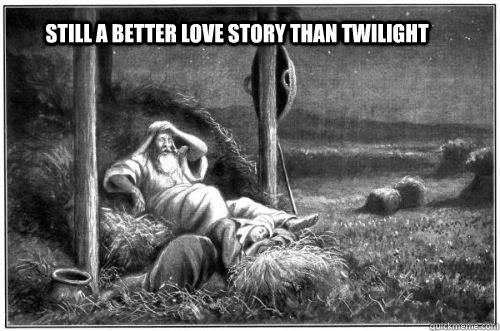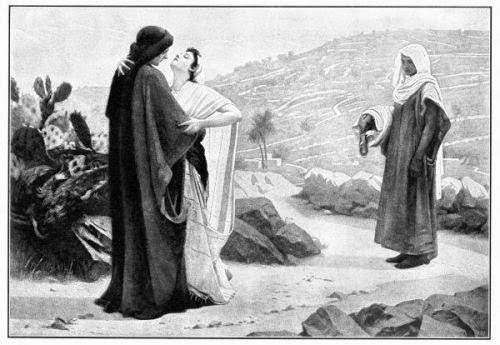All the City… Doth Know That Thou Art a Virtuous Woman
Ruth; 1 Samuel 1
LDS manual: here
Reading
After the last few blood-soaked lessons, we now arrive at the Book of Ruth. You could be forgiven for checking to make sure you’re still reading the same book. The Book of Ruth was supposed to have been written at the same time as Judges, but there’s no murder or bloodshed anywhere. There is, however, a scintilla of seduction, as we’ll see.
It’s a very short book. It’s also a very nice book. That’s the one thing about Ruth; she’s nice. She’s known for her loyalty, and for being the first convert to Judaism. Here’s a little photo collage of Christian materials about Ruth, that I got from an image search for “book of ruth”. See if you can catch any themes.
Wow — people market this like it’s a romance novel. Which, for the Bible, I suppose it is. It’s kinda hot stuff. I mean, it’s not the full-frontal Adam and Eve thing; it’s far more circumspect. Which means it’s perfect for modern Christians.
This is not to say that there’s no sex about it. Ruth is a bit of — if not a scheming little hussy — someone who keeps her eye on the ball and knows what kind of man she wants to nab.
I think this Christian treatment is a bit more on point, even though it’s a little less delicate.
The summary for Ruth doesn’t take long:
Ruth, Ch. 1: We meet Naomi. Famine has carried off her husband and two sons. She’s left with her two Moabite daughters-in-law, Orpah (whose name you always have to read twice) and Ruth. With limited options for them, she tells them to scram; she can’t give them husbands. Well, she could, but it would take too long.
Ruth 1:10 And they said unto her, Surely we will return with thee unto thy people.
1:11 And Naomi said, Turn again, my daughters: why will ye go with me? are there yet any more sons in my womb, that they may be your husbands?
1:12 Turn again, my daughters, go your way; for I am too old to have an husband. If I should say, I have hope, if I should have an husband also to night, and should also bear sons;
1:13 Would ye tarry for them till they were grown? would ye stay for them from having husbands? nay, my daughters; for it grieveth me much for your sakes that the hand of the LORD is gone out against me.
1:14 And they lifted up their voice, and wept again: and Orpah kissed her mother in law; but Ruth clave unto her.
Ruth, Ch. 2: Boaz comes on the scene. He notices Ruth gleaning (hence all the wheat imagery above). One of the nice bits of the Mosaic law was that you weren’t supposed to harvest every single grain from your fields; you were supposed to leave some for poor people to glean. He notices Ruth, and tells her to stay in his field. He even tells the workers to drop some of the wheat on purpose. Nice guy. But can you base a relationship on gleaning?
Ruth, Ch. 3: Now Naomi instructs Ruth in the Art of Getting a Man.
Ruth 3:2 And now is not Boaz of our kindred, with whose maidens thou wast? Behold, he winnoweth barley to night in the threshingfloor.
3:3 Wash thyself therefore, and anoint thee, and put thy raiment upon thee, and get thee down to the floor: but make not thyself known unto the man, until he shall have done eating and drinking.
3:4 And it shall be, when he lieth down, that thou shalt mark the place where he shall lie, and thou shalt go in, and uncover his feet, and lay thee down; and he will tell thee what thou shalt do.
Sounds a little smutty, but this is essentially a marriage proposal.
Ruth 3:5 And she said unto her, All that thou sayest unto me I will do.
3:6 And she went down unto the floor, and did according to all that her mother in law bade her.
3:7 And when Boaz had eaten and drunk, and his heart was merry, he went to lie down at the end of the heap of corn: and she came softly, and uncovered his feet, and laid her down.
He wakes up at midnight, and whoa! A woman at his feet.
Ruth 3:8 And it came to pass at midnight, that the man was afraid, and turned himself: and, behold, a woman lay at his feet.
3:9 And he said, Who art thou? And she answered, I am Ruth thine handmaid: spread therefore thy skirt over thine handmaid; for thou art a near kinsman.
Bit of a sub, that Ruth. With a foot thing.
Boaz is amenable.
Ruth 3:10 And he said, Blessed be thou of the LORD, my daughter: for thou hast shewed more kindness in the latter end than at the beginning, inasmuch as thou followedst not young men, whether poor or rich.
3:11 And now, my daughter, fear not; I will do to thee all that thou requirest: for all the city of my people doth know that thou art a virtuous woman.
Ruth, Ch. 4: There’s a bit of horse-trading. There’s someone more related to Ruth than Boaz is, so he has the right of refusal. Which he does. Boaz says:
Ruth 4:10 Moreover Ruth the Moabitess, the wife of Mahlon, have I purchased to be my wife, to raise up the name of the dead upon his inheritance, that the name of the dead be not cut off from among his brethren, and from the gate of his place: ye are witnesses this day.
And so Boaz and Ruth are married, and have seed.
The lesson manual also runs through the first bit of Samuel. God’s being a bit of a prat again, shutting up women’s wombs for the lulz.
1 Samuel 1:4 And when the time was that Elkanah offered, he gave to Peninnah his wife, and to all her sons and her daughters, portions:
1:5 But unto Hannah he gave a worthy portion; for he loved Hannah: but the LORD had shut up her womb.
Hannah says, “How about we make a deal, Jehovah — if you give me a son, I won’t cut his hair.”
1 Samuel 1:11 And she vowed a vow, and said, O LORD of hosts, if thou wilt indeed look on the affliction of thine handmaid, and remember me, and not forget thine handmaid, but wilt give unto thine handmaid a man child, then I will give him unto the LORD all the days of his life, and there shall no razor come upon his head.
She really knows what God’s into.
1 Samuel 1:20 Wherefore it came to pass, when the time was come about after Hannah had conceived, that she bare a son, and called his name Samuel, saying, Because I have asked him of the LORD.
Main points from this lesson
So, did Naomi and Boaz do it on the first date?
Let’s get into this.
Naomi knows Boaz will be alone on the threshing floor, and she tells Ruth to “go in, and uncover his feet”. And work your way up from there. The salacious connotation isn’t hard to spot.
It becomes especially interesting when you learn that some versions translate feet as legs. Feet is sometimes used as a euphemism for genitals; for example,
Judges 3:24 Surely he covereth his feet
is sometimes rendered
He is only relieving himself
Also consider: Boaz tells her to stay until the morning.
Ruth 3:13 Tarry this night, and it shall be in the morning, that if he will perform unto thee the part of a kinsman, well; let him do the kinsman’s part: but if he will not do the part of a kinsman to thee, then will I do the part of a kinsman to thee, as the LORD liveth: lie down until the morning.
On the other hand, she seems to leave without doing the deed.
Ruth 3:14 And she lay at his feet until the morning: and she rose up before one could know another.
All the same, he wants to keep the matter covered up.
Ruth 3:14 And he said, Let it not be known that a woman came into the floor.
So? Did they or didn’t they?
Well, I’m sorry to do this, but it’s kind of ambiguous. Many biblical scholars pooh-pooh the notion, but I think the text leaves an opening for Ruth and Boaz to have had slippery intercourse. The uncovering of the ‘feet’, the spreading of the ‘skirts’ — how else would you say it in a book like this?
These are supposed to be models for LDS women
I confess that I’ve had some trouble finding the point in this lesson, and I’m glad I’m not alone. It seems to me that whoever wrote the real lesson manual had the same problem.
Naomi:
How did Naomi show love and concern for her daughters-in-law when they offered to return to Bethlehem with her? (See Ruth 1:7–13.)
By telling them to go away.
What can we learn from Naomi’s concern for her daughters-in-law that can help us in our family relationships?
Make sure that you give them good advice vis-a-vis man-ensnarement.
Ruth:
Naomi counseled Ruth to perform a ritual that she hoped would result in the marriage of Ruth and Boaz (Ruth 3:1–5). By lying at the feet of Boaz, Ruth would be, in effect, proposing marriage to him. What did Ruth’s obedience to Naomi’s counsel reveal about her feelings toward Naomi?
She was willing to perfume up and shag a relative.
Hannah:
What promise did Hannah make to the Lord in 1 Samuel 1:11? What can we learn about Hannah from this promise? (She was a woman of great faith; class members may suggest additional answers.)
That she’s willing to do whatever it takes to get a child, no matter how arbitrary or unrelated. Including giving him away to a priest, which we’ll see in the next lesson.
Seriously, that’s the lesson. Sorry, Mormon women. You can have a whole book of the Bible named after you, but it’s all about getting a man or becoming a baby-making machine. Like so many books, the Book of Ruth fails the Bechdel Test.
Additional ideas for teaching
Ruth clave unto Naomi
The folks at Would Jesus Discriminate think that there might have been a Ruth/Naomi thing going on, based on the use of the word clave.
The same Hebrew word that is used in Genesis 2:24 to describe how Adam felt about Eve (and how spouses are supposed to feel toward each other) is used in Ruth 1:14 to describe how Ruth felt about Naomi. Her feelings are celebrated, not condemned.
Right, because words can only mean one thing.
Except they don’t. My copy of Strong’s renders this verb any number of ways, including following closely, staying with, and so forth.
So no, I can’t give it to them. Love your work, folks, but this is really stretching things.
Although now that I’ve seen this image of Ruth cleaving, I’m no longer so sure.
Even Orpah’s like, “Hmm…”






Recent Comments